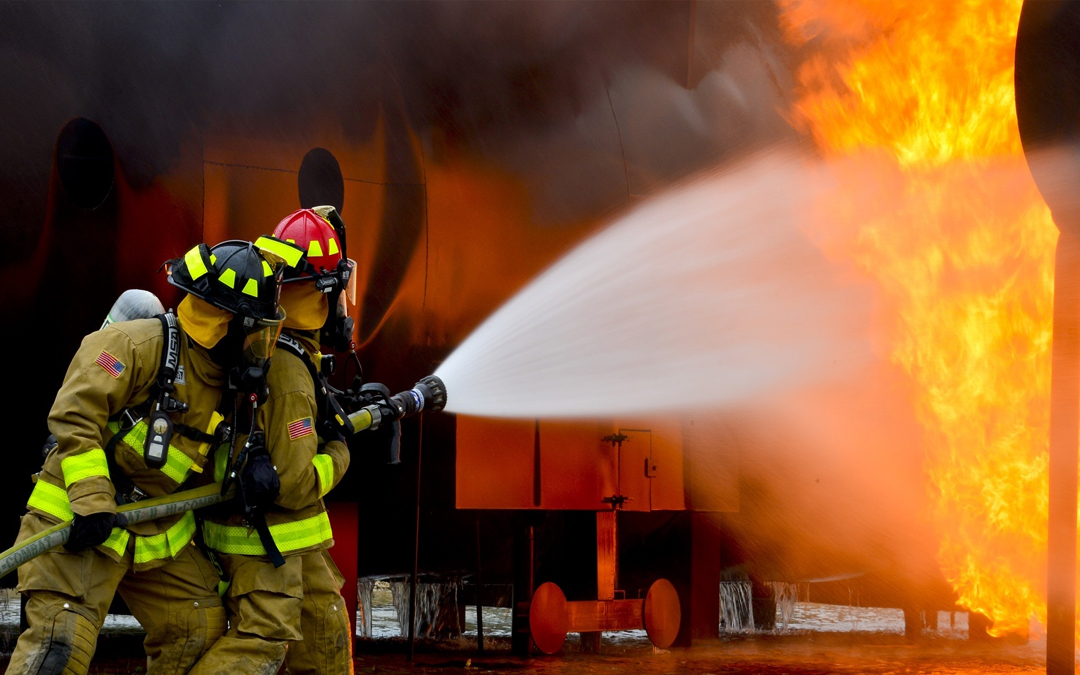Commercial fire insurance is usually sold in a complete package of business insurance. Depending on your provider, and the kind of premises you’re insuring, costs can vary. Here’s a rundown of all you need to know about the different types of commercial property insurance, and how you can reduce your fire insurance premium with fire-rated doors.
There are three types of insurance that could payout when your business has experienced a fire: buildings insurance, contents insurance, and business interruption insurance.
1. Buildings insurance
Buildings insurance covers the cost of rebuilding your premises, any professional fees, and the cost of clearing the site. In the event of a severe fire, your insurer will probably arrange the immediate involvement of a disaster recovery team.
Expect to be referred to building firms with a proven track record, trusted by the insurance company. As a result, the total cost of repairs is often higher than the market value of the company, due to the fees created as a result of these additional services.
2. Contents insurance
Contents insurance covers the cost of the equipment and stock that’s been destroyed or damaged in the fire.
The stock is insured at cost price, however, the quantity of stock may fluctuate over the year, so make these fluctuations known to ensure you have adequate cover. This is imperative if you have larger amounts of stock at peak trading times, like Christmas for example.
Business equipment is insured in two ways, either on “indemnity” or “replacement as new”. Indemnity covers your equipment but takes into account any wear and tear when settling your claim, while replacement as new is precisely that: any item that cannot be repaired or has been damaged by the fire is replaced as new.
3. Business interruption insurance
This covers the loss of business due to the prevention of normal operations. It will pay an amount to cover lost profits (before tax is deducted) and any costs that may have increased as a result of the fire, such as having to rent other premises or additional administrative and accountancy fees.
It’s worth noting this type of insurance is typically offered as an optional extra, but is crucial if you have large amounts of stock, or expensive equipment.
Purchasing fire insurance
To purchase fire insurance, contact insurance companies directly for a quote, or use a broker. Shop around, and look for products that suit the exact needs of your business. Once you understand precisely the terms of the insurance required, you can investigate further on insurance comparison websites.
Trade tip: Your trade association may have links with insurers specialising in insurance particular to your sector.
It’s essential to have open communication with your insurer. This is vital to secure full cover should a fire occur. Most insurers have a “condition of average clause”. When you apply for insurance, you state the value of the business to be protected, and you are charged your premium accordingly. This valuation needs to be regularly reviewed as the company grows to guarantee full coverage.
How is fire insurance priced?
Insurance premiums are based on how likely you are to make a claim. Your insurers assess the risks and how well you manage them, and what the potential costs are should a fire occur. If you manage your risks, you can reduce your insurance premiums considerably. One of the best ways you can do this is through preventative fire risk measures like fire-rated doors.
Click here for a guide to planning your fire escape route.
Fire-rated doors
A fire-rated door is one specifically designed to help protect human life and property damage in the event of a fire. Distinct from a fire exit door, a fire-rated door works by expanding into its frame in the presence of extreme heat, effectively welding itself shut and preventing fire from moving between rooms.
If the fire has occurred in a room protected by a fire-rated door, the reaction of the door to the fire’s heat will help protect the rest of the building from the spread of flames, and give occupants more time to safely evacuate the building. If the fire breaks out elsewhere in the building, the fire-rated door will still expand as the flames approach, protecting the room’s contents from both fire and smoke damage.
Either way, the risk reduction makes your property a safer environment, with the effect of reducing your fire insurance premium.
We offer a wide variety of custom-built fire-rated doors to suit any commercial or business property. Whether you’re securing your office, or attempting to lower fire insurance rates on your industrial warehouse, our fully tested, British Standard certified Fire-Rated Doors provide the guarantee you need to reduce insurance premiums.
Please enquire about our range of custom fire doors these are quoted depending on their specification: fire rating (FD30, FD60, FD120, FD240), size, hardware and colour.
Protecting your business from fire is common sense. Take out adequate fire insurance to reduce your fire hazards, but don’t stop there. Install smoke alarms, fire extinguishers, sprinklers and fire-rated doors – all are relatively inexpensive to fit and can cut the cost of your insurance premiums by up to 70%.
To find out more about our Fire-Rated Doors, call our team on +44 (0) 1384 220 050 or contact Latham’s Steel Security Doorsets here.

